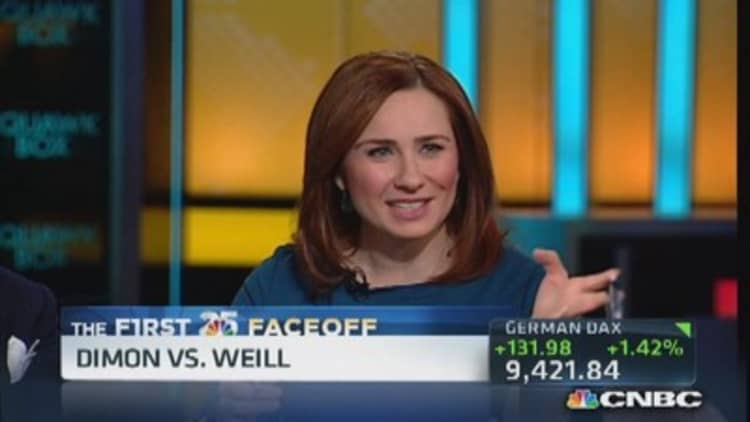
As part of its 25th anniversary, CNBC is creating a definitive list of people who have had the greatest influence in business over the past quarter century. Determining who belongs on this list—and who should rank higher—has led to some spirited debates. Today, we pit Sandy Weill against Jamie Dimon. After reading, cast your vote.
Sandy Weill
Critics of "Too Big to Fail" can blame Sanford I. Weill. The Brooklyn-born financier cobbled together a $698 billion empire of seemingly unrelated businesses into Citigroup, which in the late 1990s became the model for the modern-day financial supermarket. While running a little-known lender, Commercial Credit, Weill piled on brokerages (Smith Barney and the retail arm of Drexel Burnham Lambert), investment banks (Salomon Brothers and Shearson Lehman, which he bought back from AmEx), and insurers (Primerica and Travelers, the latter of which names the company ultimately kept). Eventually, Travelers would merge with Citicorp. Because of Weill's efforts—he was instrumental in getting repealed the Glass-Steagall Act, a Depression-era law prohibiting commercial banks and retail banks from operating together—banks can now serve Main Street and Wall Street simultaneously. That combination created the ripple effect of the mortgage meltdown during the 2008 financial crisis and nearly killed Citigroup. Other banks, which had rushed to emulate Weill's strategy, are still vying to be all things to all customers.—Kayla Tausche
Jamie Dimon
Jamie Dimon, the acerbic 57-year-old chairman and chief executive of JPMorgan Chase, is a shoo-in for the Top 25. Blunt and preternaturally bright, he's known equally for his talent with balance sheets and his ability to ruffle executive feathers. After being jettisoned from Citigroup in 1998 amid a political fight, he turned around the struggling Chicago based Bank One, parlaying that into the top job at JPMorgan a few years later. There, Dimon largely averted the U.S. financial crisis, vaulting JPMorgan to record profits and revenues in 2012. Despite a series of regulatory sanctions, his company's stock is trading near its all-time high.—Kate Kelly





